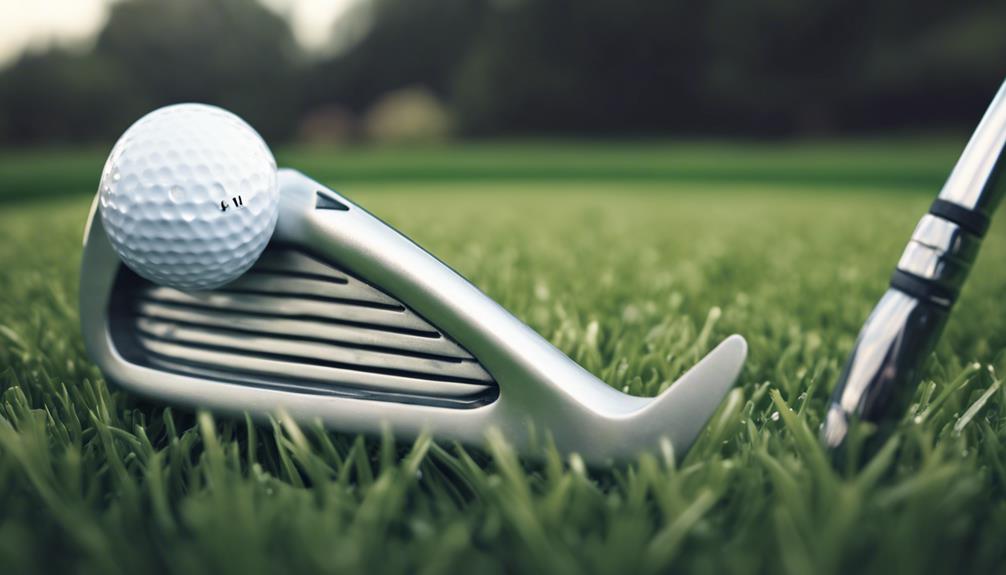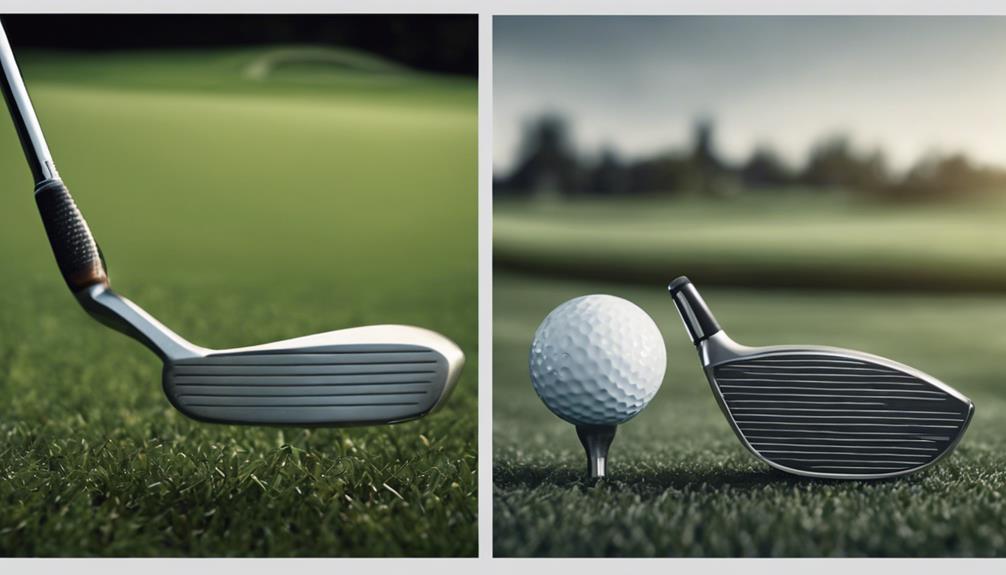- 7 Top Flite Golf Clubs XL for Improved Performance - September 28, 2024
- Top Flite Golf Clubs: Top 5 Reasons to Choose Them - September 28, 2024
- Top 3 Golf Club Fitters for a Perfect Swing - September 28, 2024
You might think aluminum is a natural fit for golf clubs, given its high strength-to-weight ratio. And you're not wrong – aluminum alloys do offer some benefits, like lightweight yet robust heads. However, most modern golf clubs aren't made entirely of aluminum due to its limitations. Corrosion, fatigue life, and performance concerns mean that stainless steel, titanium, and carbon fiber are often preferred. That being said, aluminum clubs do offer a unique balance of distance, forgiveness, and durability, making them a viable option for those on a budget. As you explore the world of golf clubs, you'll find there's more to weigh, more to ponder, and more to examine than just material.
Key Takeaways
- Yes, some golf clubs are made of aluminum, offering a lightweight and durable option for golfers.
- Aluminum golf clubs prioritize distance, forgiveness, and durability, making them suitable for golfers with slower swing speeds.
- While aluminum clubs are more affordable, they often sacrifice performance and durability compared to titanium or stainless steel clubs.
- Aluminum alloys, such as 6061 and 7075, are used in golf club heads due to their high strength-to-weight ratio and corrosion resistance.
- However, high-end golf clubs typically use materials like titanium, stainless steel, or carbon fiber for their superior performance and durability.
Aluminum Alloy Properties
When considering aluminum alloys for golf clubs, you'll want to understand their unique properties, which make them an attractive choice for this application.
One of the key benefits of aluminum alloys is their high strength-to-weight ratio, allowing for lightweight yet robust golf club heads.
The 6061 aluminum alloy, commonly used in golf clubs, boasts a tensile strength of 42,000-45,000 psi and a yield strength of 35,000-40,000 psi.
However, aluminum alloys are prone to corrosion, which can be mitigated through anodizing or coating. This process thickens the natural oxide layer, improving corrosion resistance and wear properties.
The fatigue life of aluminum alloys is also a vital consideration, as they can fail catastrophically under repetitive loading and unloading cycles.
Nevertheless, high-end alloys like 7075 offer exceptional yield strength, tensile strength, and Brinell hardness.
Additionally, aluminum alloys exhibit high thermal conductivity, helping to dissipate heat generated by the impact of the ball, reducing the risk of damage to the clubhead.
Golf Club Head Materials
Selecting the right material for your golf club head is essential, as it directly impacts the club's performance, durability, and overall feel.
You'll find that most modern golf club heads are made from stainless steel, titanium, or carbon fiber.
Titanium is a popular choice for driver heads due to its high strength-to-weight ratio, allowing for larger sweet spots and increased forgiveness.
Stainless steel, particularly 431 and 17-4ph, is widely used in golf club heads for its durability, resistance to corrosion, and smooth feel at impact.
Maraging metal, a type of stainless steel, is often used in faceplates of high-performing woods and utility irons due to its exceptional hardness and strength.
You might come across fairway woods and hybrids with heads made from a combination of materials, such as a titanium face bonded to a stainless steel body.
Notably, aluminum isn't typically used as a material for golf club heads due to its lower strength, durability, and density compared to other materials.
When choosing a golf club, consider the material used and how it aligns with your playing style and preferences.
Why Choose Aluminum Clubs

Aluminum golf clubs are gaining popularity among golfers who prioritize distance, forgiveness, and durability, as they offer a unique combination of benefits that can substantially improve your overall game.
With ideal weighting, aluminum shafts provide a good balance, making them ideal for golf clubs. The light weight of aluminum allows for faster swing speeds, resulting in increased ball distance and compression.
Additionally, aluminum clubs are durable enough to withstand the rigors of the game, reducing the need for frequent replacements. You'll appreciate the soft feel and exceptional forgiveness of aluminum clubs, which make them a great option for golfers with slower swing speeds or those who struggle with accuracy.
When paired with graphite shafts, aluminum clubs deliver a consistent and predictable ball flight, resulting in straighter shots and fewer slices. And, as an added bonus, aluminum clubs are a cost-effective option, making them an attractive choice for golfers on a budget.
Performance Vs Affordability
As you weigh the benefits of aluminum golf clubs, it's important to think carefully about the trade-offs between their affordability and performance, particularly if you're a serious golfer who prioritizes distance and accuracy.
While aluminum clubs are more affordable, they often sacrifice performance and durability, making them less ideal for serious golfers.
With regard to performance, aluminum clubs have a lower strength-to-weight ratio compared to materials like titanium or stainless steel, resulting in slower swing speeds and shorter distances.
However, they can still provide a decent level of performance for casual golfers on a budget.
The decision comes down to weighing affordability against performance and choosing the club that best fits your needs.
Aluminum clubs are generally more affordable, with prices starting from around $200 for a full set, making them an attractive option for beginners.
Despite their limitations, aluminum clubs have come a long way in recent years, with some manufacturers producing high-quality clubs that can rival more expensive options with respect to performance.
Alternatives to Aluminum Clubs

When evaluating alternatives to aluminum golf clubs, you'll find a range of materials that cater to different needs, skill levels, and budgets, each offering distinct advantages and trade-offs.
For instance, Stainless Steel clubs offer durability and a softer feel at impact, while Titanium clubs provide a high strength-to-weight ratio, ideal for driver heads.
Graphite shafts, on the other hand, reduce weight and increase swing speed, offering a softer feel and more forgiveness.
Maraging Steel is a harder material used for face inserts, allowing for thinner inserts and increased performance.
Carbon Steel, a soft and malleable material, is used in irons, wedges, and putters, requiring a protective chrome finish to prevent rust.
Copper clubs offer a softer and more forgiving option, suitable for golfers with slower swing speeds.
Hybrid clubs combine elements of irons and woods, providing a versatile alternative to traditional aluminum clubs.
Steel clubs with chrome plating offer an affordable option, while Titanium and Graphite shafts provide stronger and lighter alternatives.
Frequently Asked Questions
What Metal Are Irons Made Of?
You'll find that irons are typically made from stainless steel, offering ideal metal strengths for club durability, with modern manufacturing incorporating various material options, like titanium and forged carbon steel, to enhance golf innovations and performance metrics.
What Are Metal Golf Clubs Called?
You'll be surprised to know that 80% of golfers use metal clubs, and you're probably wondering what they're called. Metal golf clubs are categorized by clubhead materials, such as titanium, stainless steel, or carbon steel, and are labeled as drivers, irons, wedges, or hybrids, each with unique characteristics.
How Can You Tell if a Golf Club Is Forged?
When inspecting a golf club, you'll notice a forged feel via sound differences, weight variations, and visual inspection of club craftsmanship, material testing, and manufacturing process, ensuring authenticity and revealing performance benefits, club durability, and premium quality.
Is Titanium a Metal Used to Make Golf Clubs?
You'll find titanium is a premium metal used in golf clubs, offering advantages like clubhead durability, corrosion resistance, and ideal weight distribution, making it a top choice for players seeking customization and innovation.
Conclusion
As you weigh your golf club options, remember that 'you get what you pay for.'
While aluminum clubs offer an affordable entry point, their performance may not live up to the standards of more premium materials.
If you're serious about improving your game, it's worth considering alternatives that may come at a higher cost.
However, if budget is a constraint, aluminum clubs can still provide a solid starting point.
Ultimately, it's a trade-off between performance and affordability that only you can make.




